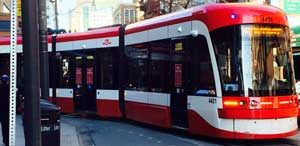Faced on the one hand with an obsolete infrastructure and a civic government that has spent far too many years neglecting needed investment, and on the other with a requirement legislated by the province (Accessibility for Ontarians with Disabilities Act) that the transit system must be made fully accessible by Jan. 1, 2025, the TTC is doing its best to meet the needs of the disabled community.
But a full upgrade to one subway station (Warden) will still likely cost $70 million.
Since 2008 the TTC has been holding annual accessibility forums at which it presents a progress report and hears the views of members of the community. The latest took place Sept. 16 at the Allstream Centre. Almost every type and shade of disability was reflected in the over 300 people who turned out.
The TTC has a 5-year plan for accessibility that started in 2014 and ends in 2018. The plan includes adding 11 more accessible subway stations, making all streetcars and stops accessible, implementing low-floor buses throughout the fleet, improving escalator and elevator reliability, improving priority seating (the blue seats) and upgrading subway announcement systems.
The sense of the room seemed to be that progress is being made, though not as quickly as might be desired.
The discussion divided its time among the regular TTC service—subways, buses, streetcars—and the WheelTrans fleet that many users depend on.
Several milestones were reported as accomplished by the TTC.
All of the surface buses are now accessible and by 2016 100% of them will be low-floor. Articulated buses with wider doors and front ramps were deployed in 2014, and audible external route service announcements are being tested on the Bayview (11) and Bathurst (7) routes.
More accessible subway stations with elevators are slowly being brought on line but it is a lengthy and expensive process. TTC staff noted that the most intractable stations are Warden and Islington, with stairways up or down to individual bus bays. A suggestion from the audience that curb cuts in the platforms be provided was met with frank misgivings on the grounds of safety. There are continuing difficulties with levels and gaps at station platforms which are slowly being dealt with.
There are now ten of the new grade-level streetcars in service. TTC believes that Bombardier may have quality control and production issues somewhat closer to under control so that deliveries can be sped up—but bringing the lines, overhead wires and platforms up to standard is still a major task. The last line to receive the new cars (506 Carlton) is not scheduled to do so until 2018 or 2019.
WheelTrans is bringing new fleets on line, and is gradually improving its booking system. By 2015, 37,500 registered users are forecast, up from 34,900 in 2013, with 3.1 million trips in 2014. The major problem with the system appears to be inflexibility; rides have to be booked in advance and most are multi-passenger (the sedan taxi portion of the fleet has its own issues since it cannot accommodate wheelchairs).
The Advisory Committee on Accessible Transit (ACAT) plays a major role in providing advice and feedback to the TTC in the upgrade process. Chaired by Mazin Aribi, it meets monthly with TTC representatives. It has a membership of fifteen which rotates five members per year, and it is currently looking to fill five slots for next year’s term. Information sessions for those interested in applying were held in October.
One point underscored by feedback heard during the discussion period is that not all disabilities can agree on the worth of particular remediations. One questioner commented that the subway announcements that “doors will open to left/right” was useless and “ridiculous.” Another intervenor then asked what was wrong with them as long as you know what direction the train is going?
The major point that emerged from the discussion was that public education and sensitivity remain an uphill battle. Although all buses are now equipped with ramps, it was alleged that many drivers can’t be bothered to deploy the manual ramp, sometimes claiming that it is out of service. It was also suggested that mobility device users be allowed to board first at stops (“and ahead of the strollers,”’ one audience member whispered to The Bulletin’s correspondent).
Leslie Carnegie of Davisville also commented on the habit of depersonalizing users with disabilities. “If I get called ‘a wheelchair’ one more time,” Carnegie told the panel, “I swear I’ll go postal.”
For more information about TTC’s accessibility services and policies, and about ACAT and its membership application sessions, visit www.ttc.ca.
Nov 2015
 TheBulletin.ca Journal of Downtown Toronto
TheBulletin.ca Journal of Downtown Toronto

